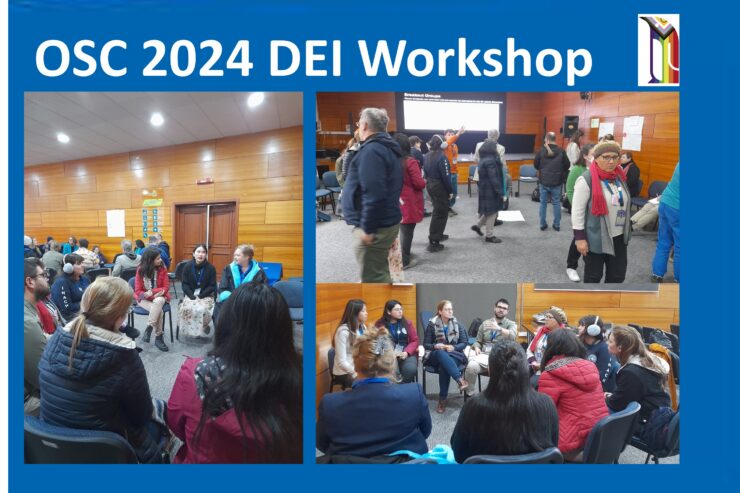W20: Synergistic approach to addressing DEI issues; learning from different contextual initiatives
(DEI = Diversity, Equality, Inclusion)

On the 20th of August 2024, a joint workshop between the Polar Science Early Career Community Office (PSECCO and the SCAR EDI AG was held during the SCAR OSC 2024 in Pucón, Chile, organized by Gerlien Verhaegen, Adriana Gulisano, Mariama Dryák-Vallies, Pilvi Saarikoski, Inga Beck, Rose Leeger, and Jilda Caccavo and led by the Adriana G., Mariama D. -V., Pilvi S., Rose L. and Jilda C. in Pucón.
The goal of the workshop was to create a plan for pursuing diversity, equity, and inclusion (DEI) action through coordinated, synergistic activities by first understanding how DEI efforts vary across international contexts, and then exploring with workshop attendees how we can learn from one another about how to improve DEI across the Antarctic research community.
After a short introduction by PSECCO and the SCAR EDI AG, a set of guidelines were outlined with participants to allow for inclusive, respectful and safe discussion, including giving space for quieter voices to express themselves, and welcoming interventions in languages other than English.
The participants were then split into three breakout groups to address priority questions identified through a community survey conducted prior to the workshop:
- How can we apply lessons learned from DEI initiatives in international/national DEI organizations or initiatives to future DEI actions in international, national and cultural contexts?
- How can we improve DEI through better education?
- How can we overcome language barriers?
The group addressing the first question emphasized that DEI improvements are achieved through managed processes, which develop with changing language and cultural norms – this must be understood by community leaders. The culture of an organisation is often shaped by the worst behavior that those in leadership are willing to tolerate. Clear guidelines of acceptable and unacceptable behavior, such as Codes of Conduct, must be established and consistently enforced by community leaders. While such approaches can be effective internationally, careful consideration is needed to adapt them for implementation in different countries.
With regards to how DEI can be integrated in education, the breakout group shared ideas including for creating spaces that celebrate different cultures within an organization. It was suggested that leaders take advantage of the diversity in their groups by learning from others’ traditions and life experiences to inform ideas and ways forward.
Finally, the last group considered strategies to overcome language barriers. One easy-to-implement strategy to improve understanding for non-native English speaker is ensuring quiet settings for meetings and discussion. Other ideas included encouraging conference organizers to provide information to attendees regarding travel to the conference location as well as cultural concerns.
The workshop was very well attended, with over 20 active participants involved in the event, many of whom were new to DEI events. Feedback was very positive, with participants noting that the wide participation in the workshop was indicative of the desire for the community to engage in these types of conversations.
One of the key outcomes of the workshop discussions was to provide DEI recommendations to the organizing committee for the next SCAR OSC, which will take place in 2026 in Oslo. The EDI AG will continue to work with the organizing committee for the next OSC to assure that its recommendations are integrated into the conference planning and execution. Recommendations include: hybrid conference access, support for caregivers, resources for non-native English speakers, and the availability of gender-neutral bathrooms.
We look forward to continuing these discussions at our next workshop at the SCAR OSC 2026.
